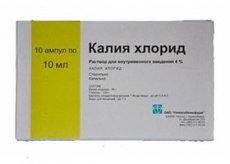Medical expert of the article
New publications
Preparations
Potassium chloride
Last reviewed: 03.07.2025

All iLive content is medically reviewed or fact checked to ensure as much factual accuracy as possible.
We have strict sourcing guidelines and only link to reputable media sites, academic research institutions and, whenever possible, medically peer reviewed studies. Note that the numbers in parentheses ([1], [2], etc.) are clickable links to these studies.
If you feel that any of our content is inaccurate, out-of-date, or otherwise questionable, please select it and press Ctrl + Enter.

Potassium chloride is a drug that helps stabilize the acid-base balance and also replenishes the lack of potassium in the body.
 [ 1 ]
[ 1 ]
Indications Potassium chloride
Indications include: hypokalemia (also developed as a result of diabetes mellitus, treatment with antihypertensive drugs, prolonged diarrhea or vomiting, and also due to the use of certain diuretics, as well as GCS), poisoning with cardiac glycosides (therapeutic and prophylactic agent), and also prevention of arrhythmias in patients with acute myocardial infarction.
Pharmacodynamics
Activates many cytoplasmic enzymes, controls the level of osmotic pressure inside cells, protein synthesis, amino acid movement, and in addition, the transmission of nerve impulses and contraction of skeletal muscles. Potassium ions slow down the heart rate, reduce the activity of contractions, and in addition reduce automatism, as well as conductivity with myocardial excitability. Small doses allow to expand the coronary vessels, and large ones, on the contrary, to narrow them.
Potassium helps to increase the level of the substance acetylcholine, and also stimulates the activity of the sympathetic department within the central nervous system. It also has moderate diuretic properties. Increasing the level of potassium reduces the risk of possible development of toxic effects of CG on the heart.
Pharmacokinetics
Potassium chloride is absorbed quickly and passively (in almost any quantities), because the concentration of the substance (both food and released from the drug) is higher not in the blood, but in the small intestine. In the large intestine and ileum, potassium is excreted into the lumen according to the scheme of conjugated ion-sodium exchange, and is excreted from the body with feces (10%). After administration, the distribution of the substance lasts approximately 8 hours: the half-life in the absorption phase is 1.31 hours.
Dosing and administration
The drug should be administered intravenously. In case of problems with heart rhythm or hypokalemia, the dose is 1-1.5 g 4-5 times a day; when the heart rhythm is restored, the dose is reduced. In case of poisoning with cardiac glycosides, the dosage is 2-3 g/day, and in severe cases it is increased to 5 g. To stop an attack of paroxysmal tachycardia, 8-12 g is prescribed (1st day), and then the dose is reduced to 3-6 g.
As a therapeutic and prophylactic agent against ectopic arrhythmias that occur as a result of myocardial infarction, a special polarizing mixture is used: you need to take a solution of potassium chloride, as well as a 5-10% dextrose solution (you need to add insulin in a ratio of 1 U/3-4 g of dextrose in dry form).
Use Potassium chloride during pregnancy
If use during pregnancy is necessary, the potential benefit to the patient must be weighed against the risk to the fetus. The FDA has assigned this substance Category C.
During the treatment period, you cannot breastfeed your child.
Contraindications
Contraindications include: intolerance to the components of the drug, acute or chronic renal failure, complete heart block, therapy with potassium-sparing diuretics. In addition, hyperkalemia, metabolic disorders (such as hypovolemia, as well as acidosis and hyponatremia), exacerbated gastrointestinal diseases, children under 18 years of age (there is no information on the safety and effectiveness of use).
Side effects Potassium chloride
Among the main side effects are:
- gastrointestinal tract: vomiting with nausea, bloating, diarrhea, ulcers on the mucous membrane, abdominal pain, intestinal obstruction and perforation, as well as bleeding;
- nervous system: muscle weakness, paresthesia, and confusion;
- others: decreased blood pressure, hyperkalemia, and allergies.
Overdose
Overdose manifestations include: development of hyperkalemia (weakening of muscle tone, arrhythmia, paresthesia, as well as weakening of AV conduction and cardiac arrest). At the initial stage, hyperkalemia is mainly manifested by an increase in the concentration of K+ in the blood serum - more than 6 mEq/l. Sharpening of the T wave also occurs, and along with this, widening of the QRS complex. Muscle paralysis and cardiac arrest occur when the concentration of K+ increases to 9-10 mEq/l.
Therapy consists of oral or intravenous administration of sodium chloride solution. If necessary, hemodialysis with peritoneal dialysis is performed.
Interactions with other drugs
Potassium-sparing diuretics (such as spironolactone, as well as amiloride with triamterene), as well as ACE inhibitors (such as enalapril and captopril) and NSAIDs increase the risk of hyperkalemia.
Pharmaceutical combination with SG solutions is possible – potassium chloride promotes better tolerability.
Increases the negative dromotropic and bathmotropic effects of antiarrhythmic drugs.
As a component of a polarizing mixture (compound with insulin and dextrose), it helps stabilize the heart rhythm in case of myocardial infarction, as well as in case of SG overdose or ectopic arrhythmia.
 [ 30 ]
[ 30 ]
Shelf life
Potassium chloride is permitted to be used for 3 years from the date of manufacture.
 [ 34 ]
[ 34 ]
Attention!
To simplify the perception of information, this instruction for use of the drug "Potassium chloride" translated and presented in a special form on the basis of the official instructions for medical use of the drug. Before use read the annotation that came directly to medicines.
Description provided for informational purposes and is not a guide to self-healing. The need for this drug, the purpose of the treatment regimen, methods and dose of the drug is determined solely by the attending physician. Self-medication is dangerous for your health.

